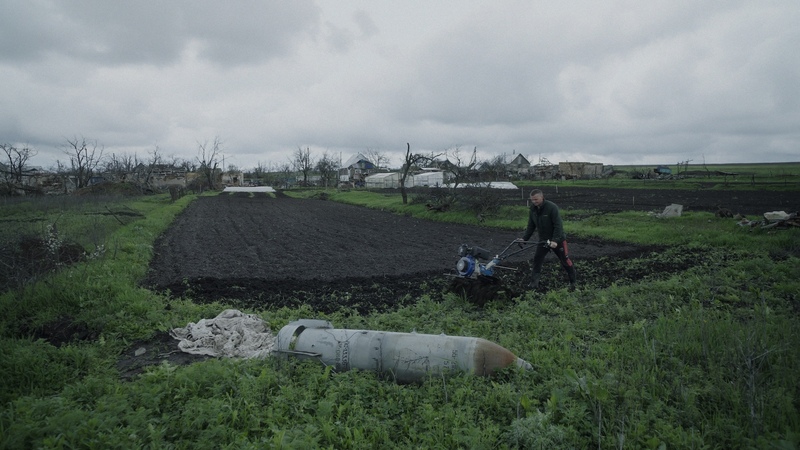
Where the Camera Doesn’t Look Away
MOVIE REVIEW
Militantropos (Мілітантропос)
–
Genre: Documentary
Year Released: 2025
Runtime: 1h 50m
Director(s): Yelizaveta Smith, Alina Gorlova & Simon Mozgovyi (Tabor Collective)
Where to Watch: shown at the 2025 Cannes Film Festival
RAVING REVIEW: This isn’t the kind of documentary that waits for your attention—it confronts you, without spectacle, with a reality that refuses to be simplified. Every sequence has an emotional honesty baked into it that refuses to play to expectations. Whether observing the resilience of those rebuilding in silence or the disorienting calm before the next strike, the work isn't asking for sympathy. It's asking for presence.
MILITANTROPOS resists the standard mechanics of documentary storytelling. You won’t find a structured arc, a narrator explaining what you’re supposed to feel, or a tidy emotional payoff. Instead, you’re immersed in fragments of experience—often incomplete, always raw. Rather than following one subject or crafting a cohesive timeline, the filmmakers present a cross-section of individuals caught in an ongoing catastrophe. It’s not about explaining the war; it’s about showing what it does to the people who live through it.
This piece's staying power isn’t its narrative—it’s the method behind it. Created by the Ukrainian Tabor Collective, the film was made by those living the crisis, not outsiders reporting from a distance. That proximity changes everything. When your subjects are your neighbors and your backdrop is your home, the camera doesn’t just record—it witnesses. That perspective shift is subtle but substantial, grounding each moment in a sincerity that can’t be staged.
The production process itself was shaped by instinct and improvisation. There were no pre-arranged interviews; most encounters happened organically. The crew met their subjects on the ground—sometimes during evacuations, other times at military outposts, and occasionally during unplanned detours.
Editing mirrored the on-the-fly nature of the shoot. As some members filmed, others cut footage in real time, creating a fluid back-and-forth rhythm that blurred the line between gathering and shaping. The result feels almost poetic—scenes echo one another through thematic rhymes instead of linear beats. One moment bleeds into the next not through plot, but through tone and association, encouraging viewers to connect meaning emotionally rather than intellectually.
Nature, often an afterthought in war narratives, plays a pivotal role here. The sky—its moods, silence, and distance—is a recurring presence. Thunder rolls in over abandoned villages. Clouds stretch across fields still scarred from conflict. These aren’t just transitions; they’re visual reminders that the environment, like its people, is bearing the marks of war. The filmmakers return to certain landscapes repeatedly, treating them almost like characters—wounded, watching, enduring.
Sound plays just as significant a role. Real-world audio captured on-site becomes the heartbeat of the film. From the thud of artillery to the quiet rustle of trees, the contrast between the mechanical and the organic is used to powerful effect—a drone whirs by in one scene. Next, you hear a child’s voice echoing through the air.
Crucially, the film never sacrifices ethics for impact. The collective made deliberate decisions to avoid exploitative imagery. People were filmed only with consent. When someone declined to be captured, the camera turned away. There’s an intentional respect throughout that never feels performative. It’s not about highlighting suffering—it’s about letting people decide how their stories are shared. And that extends to the piece's tone, which prioritizes vulnerability and agency over shock value.
This commitment to accountability continued off-screen. The filmmakers became active participants in the communities they filmed, helping rebuild homes, distributing supplies, and setting up ongoing volunteer efforts. That level of involvement isn’t just noble; it adds another layer of responsibility to the storytelling. They weren’t just gathering material but investing in the futures of the people they documented. That intimacy deepens the emotional weight of what unfolds on screen.
At the heart of the film lies a conceptual term from which its title is derived—a word meant to reflect the shift that occurs when ordinary life is overtaken by war. This isn’t just about uniforms or weaponry. It’s about how trauma reshapes identity, forcing people to evolve into versions of themselves built for survival. That evolution is never spelled out, but you see it—in a glance, a silence, a changed routine. Transformation isn’t announced. It’s implied.
MILITANTROPOS is a cinematic document built on proximity, process, and participation. It’s as much about what’s not said as what is, capturing the moments that usually slip through the cracks. It doesn’t follow traditional structures because it doesn’t need to. Instead, it offers a fragmented, real, and quietly devastating mirror. What you see in that mirror depends entirely on how closely you’re willing to look.
Please visit https://linktr.ee/overlyhonestr for more reviews.
You can follow me on Letterboxd, Instagram, Twitter, and YouTube. My social media accounts can also be found on most platforms by searching for 'Overly Honest Reviews'.
I’m always happy to hear from my readers; please don't hesitate to say hello or send me any questions about movies.
[photo courtesy of SQUARE EYES, TABOR PRODUCTION, LES VALSEURS, MISCHIEF FILMS]
DISCLAIMER:
At Overly Honest Movie Reviews, we value honesty and transparency. Occasionally, we receive complimentary items for review, including DVDs, Blu-rays, CDs, Vinyl Records, Books, and more. We assure you that these arrangements do not influence our reviews, as we are committed to providing unbiased and sincere evaluations. We aim to help you make informed entertainment choices regardless of our relationship with distributors or producers.
Amazon Affiliate Links:
Additionally, this site contains Amazon affiliate links. If you purchase through these links, we may receive a commission. This affiliate arrangement does not affect our commitment to honest reviews and helps support our site. We appreciate your trust and support in navigating these links.



Average Rating